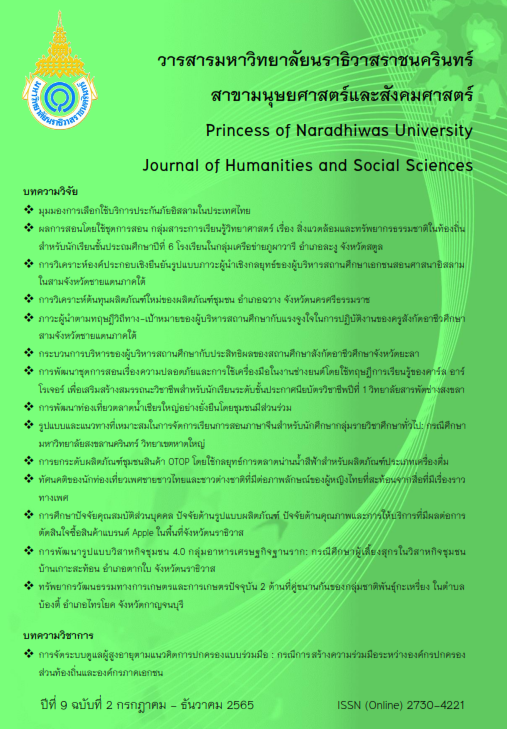Elderly Care System Arrangement based on the Concept of Collaborative Governance: A case study of local government organizations and private organizations
Main Article Content
Abstract
Local government organizations play a major role in health care system for the elderly. However, the local government organizations have had limited budget and human resource. Therefore, it is necessary to seek cooperation from other agencies, especially the private sector, organizations with its ability and flexibility to work for the elderly. The objectives of this academic article were (1) to study a collaborative working between local government organizations and private organizations in managing the health care system for the elderly, based on the concept of collaborative governance and (2) to investigate factors affected its success.
The findings showed that the elderly care system consisted of four steps as follows: (1) Cooperation initiatives, (2) Motivation in working together, (3) Working with strategies and (4) Conflict management. The factors affecting the success of the elderly care system included (1) Facilitative leadership of local administrators, (2) Similarities of organization cultures and (3) Characteristics of private organizations.
Article Details

This work is licensed under a Creative Commons Attribution-NonCommercial-NoDerivatives 4.0 International License.
References
ชลธิชา อัศวนิรันดร, ชฎาธาร โอษธีศ, วัชระ เพชรดิน, วิรัลพัชร มานิตศรศักดิ์, และนลัท จิลลานนท์.(2563). โครงการรูปแบบการจ้างงานผู้สูงอายุในภาคเอกชนของไทย: ความยืดหยุ่น ผลิตภาพ และการคุ้มครอง (รายงานวิจัย). วิทยาลัยประชากรศาสตร์ จุฬาลงกรณ์มหาวิทยาลัย.
ชัยวัฒน์ เอี่ยมประภาศ. (2561). ผลสัมฤทธิ์ในการจัดสวัสดิการสังคมให้กับผู้สูงอายุของเทศบาลในภาคตะวันตกของประเทศไทย.วารสารราชนครินทร์, 15(4), 39-51.
ฉัตรทิพย์ ชัยฉกรรจ์. (2560). การจัดการปกครองแบบประสานความร่วมมือ (collaborative governance) : แนวคิด วรรณกรรมคัดสรร และคำสำคัญ. Veridian E-Journal, 10(3),286-298.
ณัชพล บดิการ. (2559). ศักยภาพของเทศบาลตำบลปากแพรก (อำเภอเมือง จังหวัดกาญจนบุรี) ในการดูแลผู้สูงอายุ (วิทยานิพนธ์ปริญญาศิลปศาสตรมหาบัณฑิต). มหาวิทยาลัยศิลปากร, นครปฐม.
ทิพย์รัตน์ จิตตเดชาธร. (2559). การบริหารความขัดแย้งในโรงเรียนวัดพระปฐมเจดีย์ (มหินทร ศึกษาคาร) (การค้นคว้าอิสระปริญญาศึกษาศาสตรมหาบัณฑิต). มหาวิทยาลัยศิลปากร, นครปฐม.
ประสพโชค ตันสาโรจน์. (2559). บทบาทของเทศบาลเมืองกาญจนบุรีในการดูแลผู้สูงอายุ (วิทยานิพนธ์ปริญญาศิลปศาสตรมหาบัณฑิต). มหาวิทยาลัยศิลปากร, นครปฐม.
พันนิภา บุญจริง. (2558).การพัฒนารูปแบบการดําเนินงานชมรมผู้สูงอายุ ตำบลธาตุน้อย อำเภอเขื่องในจังหวัดอุบลราชธานี. วารสารเทคโนโลยีภาคใต้, 8(2), 1-8.
มูลนิธิสถาบันวิจัยและพัฒนาผู้สูงอายุไทย (มส.ผส.). (2563). สถานการณ์ผู้สูงอายุไทย พ.ศ. 2562. นครปฐม: สถาบันวิจัยประชากรและสังคม มหาวิทยาลัยมหิดล.
ยุวดี รอดจากภัย, และกุลวดี โรจน์ไพศาลกิจ. (2560). การพัฒนาเครือข่ายทางสังคมในการดูแลผู้สูงอายุ (รายงานวิจัยฉบับสมบูรณ์). มหาวิทยาลัยบูรพา.
วสันต์ ศรีสมพงศ์. (2559). การบริหารจัดการแบบร่วมมือในโครงการคลองหมอนนา ตำบลรำแดงอำเภอสิงหนคร จังหวัดสงขลา (วิทยานิพนธ์ปริญญารัฐประศาสนศาสตรมหาบัณฑิต).มหาวิทยาลัยสงขลานครินทร์, สงขลา.
วิไลลักษณ์ พรมเสน, และอัจฉริยา ครุธาโรจน์. (2560). บทบาทขององค์กรปกครองส่วนท้องถิ่นในจังหวัดลำปางต่อการส่งเสริมการมีงานทำและการสร้างรายได้แก่ผู้สูงอายุ. วารสารการบริหารท้องถิ่น, 10(2), 70-91.
วริยา จันทร์ขำ, หทัยชนก บัวเจริญ, และชินวุฒิ อาสน์วิเชียร. (2558). รูปแบบการดูแลผู้สูงอายุโดยชุมชนท้องถิ่นจัดการตนเอง กรณีศึกษา: องค์การบริหารส่วนตำบลท่างาม อำเภออินทร์บุรี จังหวัดสิงห์บุรี. วารสารวิจัยเพื่อการพัฒนาเชิงพื้นที่, 7(3), 22-41.
ศิริมา สุวรรณศรี, เอกอนงค์ ศรีสำอาง, สมศักดิ์ เจริญพูล, และพนารัตน์ พรมมา. (2563). รูปแบบการสร้างเครือข่ายและการมีส่วนร่วมในการจัดสวัสดิการสังคมผู้สูงวัยขององค์การบริหารส่วนตำบลหนองโพธิ์ อำเภอหนองหญ้าไซ จังหวัดสุพรรณบุรี. วารสารบัณฑิตวิทยาลัย มหาวิทยาลัยสวนดุสิต, 16(2), 117-135.
สุดารัตน์ สุดสมบูรณ์, วิรัตน์ ธรรมาภรณ์, ทวีศักดิ์ พุฒสุขขี, ปุญญพัฒน์ ไชยเมล์. (2559). บทบาทขององค์กรปกครองส่วนท้องถิ่นในการดูแลผู้สูงอายุไทย. วารสารเทคโนโลยีภาคใต้, 9(1), 121-127.
อลงกต สารกาล. (2563). ความสำเร็จของการบริหารจัดการปกครองท้องถิ่นบนฐานเครือข่ายความร่วมมือ: บทเรียนจากโครงการการจัดระบบบริการรองรับสังคมผู้สูงอายุในเขตเทศบาลเมืองกาฬสินธุ์. วารสารการจัดการภาครัฐและภาคเอกชน, 27(2), 27-46.
Agranoff, R., & McGuire, M. (2003). Collaborative public management : new strategies for local governments. Washington, D.C.: Georgetown University Press.
Ansell, C., & Gash, A. (2007). Collaborative governance in theory and practice. Journal of Public Administration Research and Theory, 18, 543-571
Beran, D., Perone, S. A., Alcoba, G., Bischoff, A., Bussien, C.-L., Eperon, G… Chappuis ,F. (2016). Partnerships in global health and collaborative governance: Lessons learnt from the Division of Tropical and Humanitarian Medicine at the Geneva University Hospitals. Globalization and Health, 12, 14.
Berends, L., Ritter, A., & Chalmers, J. (2015). Collaborative governance in the reform of Western Australia’s alcohol and other drug sector. Australian Journal of Public Administration, 75(2), 137–148.
Bussu, S., & Bartels, K. P. R. (2014). Facilitative leadership and the challenge of renewing local democracy in Italy. International Journal of Urban and Regional Research, 38(6), 2256-2273.
Emerson, K., Nabatchi,T., & Balogh, S. (2011). An integrative framework for collaborative governance. Journal of Public Administration Research and Theory, 22, 1-29.
Fisher, J., Stutzman, H., Vedoveto, M., Delgado, D., Rivero, R., Dariquebe, W., Contreras, L, S., Souto,T., Harden, A. & Rhee, S. (2020). Collaborative Governance and Conflict Management: Lessons Learned and Good Practices from a Case Study in the Amazon Basin. SOCIETY & NATURAL RESOURCES, 33(4), 538-553.
Purdy, J. M. (2012). A framework for assessing power in collaborative governance processes. Public Administration Review, 72(3), 409–417.


